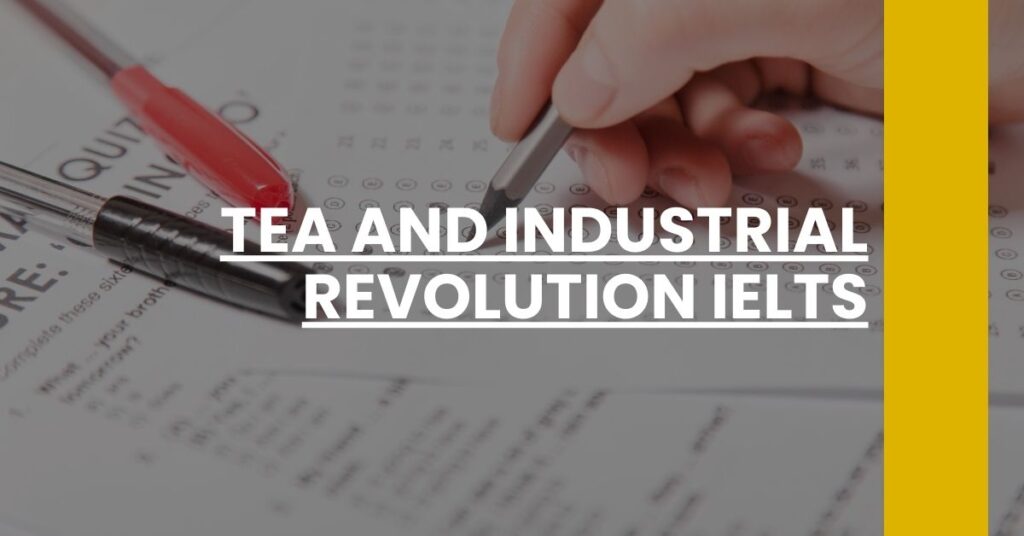The consumption of tea played a pivotal role in fueling the Industrial Revolution, especially in Britain. It was not only a trade commodity but also a social beverage that bolstered workers’ health and productivity.
In “Tea and Industrial Revolution IELTS,” readers will explore:
- How tea shaped economic and social structures
- Tea’s impact on colonial expansion and worker efficiency
Those preparing for IELTS exams can grasp the historical importance of tea in transforming industrial societies — a still-relevant topic today.
- The Role of Tea in the Industrial Revolution
- Tea as a Commodity During the Industrial Era
- The Impact of Tea on Workers’ Productivity
- Tea Trade and Colonial Expansion
- Social Changes Brought by Tea Consumption
- IELTS Reading Passage: Decoding Tea and Industrial Revolution
- Tips for IELTS Reading Test Success
- Sample IELTS Questions Related to the Topic
- Conclusion: Understanding the Significance of Tea in the Industrial Age for IELTS
The Role of Tea in the Industrial Revolution
Tea, often considered just a soothing brew, was a powerhouse behind the scenes during the Industrial Revolution. When you delve into this segment of history, you’ll realize that the innocuous tea leaf was a catalyst in the transformation of societies and economies. Let’s pour over the details.
A Brew that Fueled an Era
You might wonder how such a simple drink could impact an entire era. During the Industrial Revolution, workers shifted from agrarian lifestyles to labor-intensive factory work. In this new, grueling setting, tea became more than a luxury—it was an energizing staple. The caffeine in tea helped workers maintain long hours, and the simple act of boiling water to make it helped reduce the prevalence of waterborne diseases. The combination of these factors made tea instrumental in supporting the burgeoning workforce of the time.
The Guardian cites that boiled water from tea significantly reduced mortality rates among industrial workers. To understand how pivotal this was, imagine the health transformation from an era rife with disease to one where productivity soared because a healthier workforce could fuel industry growth.
Tea and Economic Growth
In terms of sheer economics, tea played a central role. The importation of tea pointed to shifting dietary patterns with an increased reliance on imported goods. As you sip on your next cup, consider that the trade and consumption of tea outlined a blueprint for global trade networks that are still pertinent today.
Economic Studies suggests tea’s inclusion in the British diet marked a pivotal shift that underscores an evolved economy—one that banked on the heightening efficiency that caffeinated workers provided.
Tea as a Commodity During the Industrial Era
Tea wasn’t just a beverage; it became a highly commoditized product that created ripples across the global economy, especially for Britain.
A Trade of Imbalance
The British Empire’s appetite for tea led to a significant trade imbalance with China. To offset this, Britain exported large quantities of opium to China, leading to the infamous Opium Wars. This underscores an uncomfortable detail of history: the demand for tea had long-reaching consequences that extended far beyond the tea cup.
More insight into the profitability and impact of the tea trade, especially in relation to the Opium Wars, is found in The Economist’s exploration of the tea trade.
The Impact of Tea on Workers’ Productivity
In factories filled with smoke and noise, the tea break emerged as a brief respite. You can imagine workers gathered around, steaming mugs in hand, finding respite in their toil.
Tea Time: A Working Class Battle Tea breaks served as a battleground for improved working conditions. Arguably, these breaks played a pivotal role in advocating for workers’ rights—an aspect that shaped labor laws and working conditions permanently.
The website Tea, Toast, and Travel gives a tasteful recount of how tea breaks were integral in the fight for better conditions, ensuring workers could gather their strength to endure the rigors of their jobs.
Tea Trade and Colonial Expansion
Beyond providing a boost to workers, tea was an imperial tool for colonial expansion, requiring vast imports from colonies and deeply influencing British foreign policy.
The East India Company’s Monopoly
The almighty East India Company held a gripping monopoly over the tea trade. This monopoly wasn’t just about business; it was about the power to govern the tides of an empire.
Looking further into the Boston Tea Party and its significance in American history, the monopoly on tea trade can be seen as a lightning rod for democratic and colonial upheaval. State.gov walks you through key historical events where the monopoly had far-reaching consequences.
By exploring the economic and political tangles of tea trade, you’re not just learning about a beverage but engaging with the intricate web of the Industrial Revolution’s economic and colonial dynamics—key for anyone interested in acing the IELTS or simply understanding the bevvy’s place in shaping modern history.
Social Changes Brought by Tea Consumption
As you steep yourself in the tales of tea and the Industrial Revolution, consider its profound impact on the fabric of society. Tea didn’t just change the pace of work; it transformed social customs and norms. During the Industrial Revolution, tea began its journey as a beverage for the elite, gradually permeating every stratum of society, and with it, bringing about unexpected social changes.
A Unifying Brew Despite its upper-class origins, tea eventually became a great social equalizer. It found its way into the cups of aristocrats and factory workers alike, creating a shared experience across the classes. As you enjoy your cup of tea, imagine it as a historical thread, weaving through the diverse tapestry of 18th and 19th-century life.
Tea culture blossomed as production increased, ushering in routine tea breaks that cut across class lines. This new ritual not only provided much-needed rest for the workers but also fostered a sense of community. Reflect on this the next time you partake in this centuries-old tradition. To dig deeper into the sociocultural fabric interwoven with tea, make your next stop at the informative Tea in the United Kingdom Wikipedia page.
IELTS Reading Passage: Decoding Tea and Industrial Revolution
For those preparing for the IELTS, comprehending the historical significance of tea during the Industrial Revolution is vital. It’s a prime example of how a commodity can influence socioeconomic structures—essential knowledge for test-takers.
When you encounter a reading passage related to the tea and industrial revolution IELTS topic, approach it with a critical eye. Understand that it’s not just about memorizing facts, but analyzing the broader implications of tea’s role during this transformative period.
If your IELTS practice material doesn’t cover this topic in depth, don’t fret. You can craft your understanding by recognizing the interplay between commodities like tea and the major shifts in industrial society—information that’s handy for tackling reading comprehension beyond the IELTS exam.
Tips for IELTS Reading Test Success
On the IELTS reading test, you’ll find a plethora of topics, but few are as rich and multi-faceted as tea’s contribution to the Industrial Revolution. Success lies in mastering the ability to weave together diverse information, much like the multifaceted threads of this historical narrative.
- Practice Skimming and Scanning: When you come across passages detailing the era’s history, practice identifying key themes quickly. Time management is crucial.
- Build Vocabulary: Acclimate yourself with the lexicon of the period—terminology like ‘commoditization,’ ‘trade imbalance,’ or ‘colonial expansion’ will likely crop up.
- Understand Context: Recognize the social and historical context surrounding the Industrial Revolution. Grasping the essence of topics related to tea and industrial revolution IELTS can give you a distinctive edge.
The key to IELTS reading is less about rote memorization and more about understanding the implications of historical events. Keep this in mind, and you’ll turn a complex subject into an opportunity to showcase analytical prowess.
Sample IELTS Questions Related to the Topic
Imagine sitting down on the day of your IELTS exam and finding a passage about the Industrial Revolution. To ensure you’re prepared, here are sample questions that could come your way:
- How did tea consumption affect the health and productivity of workers during the Industrial Revolution?
- In what ways did the trade and taxation of tea influence Britain’s colonial policies?
These aren’t just questions for an exam; they’re gateways into understanding the profound impacts of a simple beverage on the course of history.
Conclusion: Understanding the Significance of Tea in the Industrial Age for IELTS
Throughout this article, you’ve discovered the unexpected ways in which tea catalyzed the Industrial Revolution—and now understand why this topic might be part of your IELTS reading passage. As you prepare for your exam, remember that the tale of tea encapsulates the complexities of an era marked by significant social and economic transformations.
For those deeply immersed in the tea and industrial revolution IELTS journey, rest assured that your newfound knowledge won’t just help on test day. It will also provide a refreshing perspective on how historical ingredients brew together to shape modern society. So, as you take your next sip, remember that every cup holds a story—one that’s enriched the pages of history books and now, your IELTS prep material.
Explore the role of tea in the Industrial Revolution for IELTS success: trade impacts, worker productivity, and social change.

